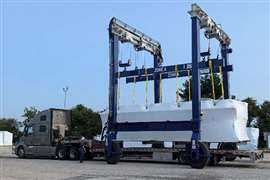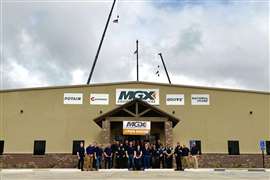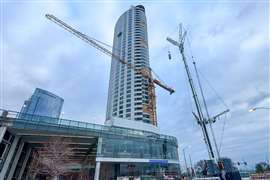Izabella Dudnakova talks to Tehstroycontract's head of rental, Maxim Ryabov
22 December 2009

Izabella Dudnakova, IRN's correspondent in Russia, talks to Maxim Ryabov, head of rental at Tehstroycontract, rental company and Hitachi dealer.
The Moscow office of Tehstroycontract has a very open, democratic atmosphere. Breaking from traditional Russian practice, Maxim Ryabov shares a spacious office with other managers.
This may help him manage his department effectively during troubled times, but it doesn't create a peaceful environment for an interview.
Even so, with his telephone ringing constantly and colleagues asking him questions, Mr Ryabov remains focused and calm.
Asked about the development of rental in Russia he proclaims that he wants "an excavator for every housing estate!" It's a joke reference to old Soviet-era slogans, but his underlying message is serious; "I just want the rental business in Russia to become as important as in Western countries.
"Unfortunately, we are only in the beginning: rental business became active only about 10 years ago. And if in other countries 50% of equipment is hired, in Russia only 7% of the equipment is hired".
Compared to Western companies, Tehstroycontract's rental fleet isn't that large - 1100 machines and 300 items of construction equipment. But in the Russian market this number of machines is significant.
From year-to-year the company's rental fleet increases by 20-30%, and Mr Ryabov anticipates that by 2010 they will have about 1200 machines.
The company operates a very large network of representative offices in the country - currently around 110 that have rental equipment.
Mr Ryabov hopes that by expanding the range and quantity of the machinery and equipment, the prospects of success for the rental business will improve.
"Our short-term goal is to create a supermarket of construction equipment so that customers could rent from each office of Tehstroycontract everything they need - from workmen's shelters to heavy machinery. We regard Cramo as a good example of a company who have achieved this", says Mr Ryabov.
In the next couple of years the company's machinery range, which includes brands Hitachi, New Holland, Sakai, Bell, Hidromek and Airman, will be expanded with new types of equipment.
Mr Ryabov sees high demand for mobile cranes, concrete pumps, self-propelled access equipment, alongside scaffolds and portable site buildings.
But the current business still has the focus on large machines that have been the core of the fleet since the rental business was established in 2002.
That was five years after the business was founded in Moscow by Aleksandr Semionov and Dmitry Zubenko.
It took delivery of the first Hitachi excavator in 1998, and already within five years it was selling 1000 units a year. Today, Tehstroycontract has developed businesses covering sales of new and used machinery, rentals, production of attachments and spare parts, and a transport service.
At the moment Tehstroycontract is an exclusive distributor of Hitachi earthmoving machinery, importing annually around 1000 excavators and other machinery. Hitachi equipment represents around 80% of the rental fleet.
The company, which employs 2000 staff, also has dealer agreements with New Holland, Case IH, Sakai, Tadano, Airman, Denyo, Bell, Hidromek, Hangcha, Tsurumi, Chang Lin, Peng Pu.
The rental business was started as a support operation for the main sales activity, and the initial fleet comprised 170 machines in Moscow and a further 60 in the regions.
However, the company's management soon realised that the rental business could develop independently and bring profits.
It was at this point that Maxim Ryabov was invited to join the company, and between 2004 and 2009 he has grown the rental business to its current market leading position: the network has increased from 30 to 110 locations and the fleet expanded from 260 to 1100 machines.
Profits from the business have been growing 150% year on year and revenues reached US$50 million in 2008 and are expected to be at a similar level this year.
In a normal economic situation Mr Ryabov's plan of creating a rental supermarket would have been executed by 2010. Before the crisis hit, the rental department was short of machines - clients who wanted to rent popular Hitachi 20 t and 30 t excavators had to wait in the queue.
At the start of 2009 sales dropped 80% to the level of 2003 and no one at Tehstroycontract knew what this year's peak construction season would bring.
It brought stabilization - the rental business reduced by only 10%, although Tehstroycontract had to close 10 of the small regional offices opened in 2008.
To stay in the game, the company has reduced its costs, offered special marketing programs and started to improve services. "While machines were going out like hotcakes, passive sales were enough. But in 2009 I set new tasks: proactive sales, better customer support, improving of service.
"We've already had good results, enough to say that I won't need to reduce our staff. Also since the last year we have integrated an Oracle ERP-system for head office and regional offices", says Mr Ryabov.
There is a phrase written in bold type in Tehstroycontract's corporate brochure: 'We are trying to be close to customers', which explains how the network grew so fast.
The company opens offices everywhere where they have clients, even if there is only one client. It has 110 branches all over Russia - more then any other supplier - and plans to open 30 more in Siberia and the Far East.
At the start, the focus was cities with populations of over 1 million people - St Petersburg, Nizhniy Novgorod, Kazan, Yekaterinburg.
Alongside these, branches were opened in areas where state projects are being carried out, such as oil and gas pipeline construction in Surgut, Nakhodka, Nefteyugansk and Novy Urengoy, and the construction of sport facilities in Sochi where the 2014 Winter Olympic Games will be held.
This policy has helped the company survive in difficult times, because the Russian government continues to finance these projects. Sochi is the most productive area now.
Over 30 Hitachi excavators, New Holland loaders and Sakai compactors are involved in the construction of roads and ski lines and Tehstroycontract is planning to expand the Sochi rental fleet to 100 machines.
Other major projects include the construction of a gas pipeline in Sakhalin (projects Sakhalin-1 and Sakhalin-2), where Tehstroycontract has 15 excavators working; electric power line work around the Boguchanskaya hydroelectric power station; and at Kozmino where 12 excavators are helping to build an oil storage plant and oil pipeline.
While Cramo and Ramirent are among the rental companies operating in Russia, Tehstroycontract says it doesn't yet have any major competitors in the heavy equipment market, although it does face competition in certain cities or construction sites from small, local rental players.
Mr Ryabov gives one example; "When we opened an office in Surgut in 1999, there were no construction machines. Then competitors came. Now there are hundreds of machines standing idle."
Mr Ryabov, thinking about potential competitors, expresses concern over possible rental businesses from Caterpillar, Komatsu and some other manufacturers in Russia. However he says that it will take them at least five years to build the business and make it profitable.
Despite the difficulties relating to the current financial crisis and the specific Russian obstacles to the development of rental (see box story), Maxim Ryabov smiles as he responds to a question about the future of the rental sector in Russia; "I do believe in a professional rental market in Russia. The situation will change for the better when a machine rental cost less then a crew of workers digging a hole with shovels".
BOX STORY
The Russian factor
Maxim Ryabov can give several examples of factors specific to Russia that hinder the development of rental. Above all, gaps in the law concerning bad debts and accounts receivable.
"We often face the situation when companies rent our machinery and don't pay debts. Most of such companies are fake companies.
"To protect rental companies, businessmen and government services should work together to create black list of non-payers and fake companies. It also makes sense to organise a Russian association of rental companies", says Mr Ryabov.
Another problem is that Russian customers prefers to take machines with an operator, but there is lack of professional operators in the country. This means that Tehstroycontract has to manage a staff of 650 operators.
"One of our customers hired a skid steer loader for the construction of golf links", says Mr Ryabov, "Specialists at the company spent two month training the operator for this special task.
"And after that, every time they need to do something on a field they ask us to give them skid steer with that operator!"



